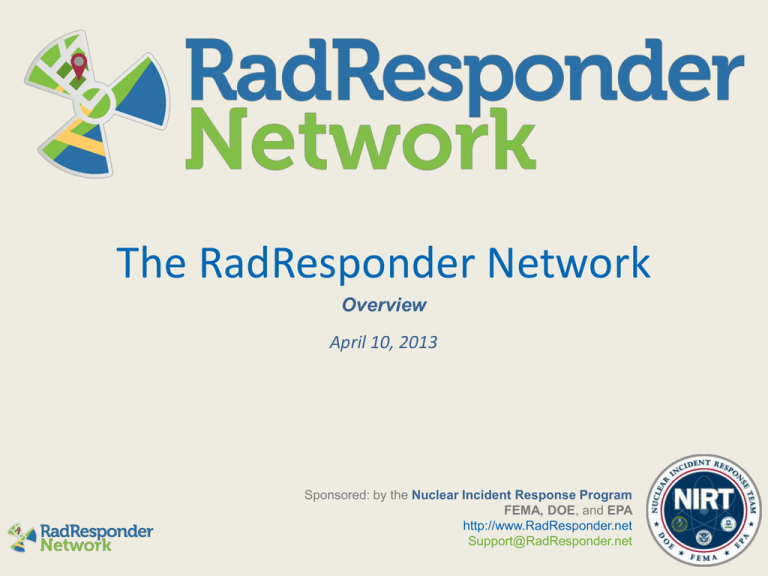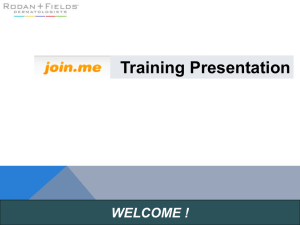RadResponder Network - National Radiological Emergency
advertisement

The RadResponder Network Overview April 10, 2013 Sponsored: by the Nuclear Incident Response Program FEMA, DOE, and EPA http://www.RadResponder.net Support@RadResponder.net RadResponder Network Rapid, accurate characterization is the key to saving lives after a radiological emergency More Data. Better Data. Faster Data https://www.RadResponder.net Support@RadResponder.net RadResponder Network Cold war mind set • Massive attack. Everybody’s dead anyway. Except Wyoming. • It’s the fed’s responsibility. Post cold war • Different threats: Nuclear Power Plants, RDD’s, IND’s • Enormous variability in impacts and fallout patterns • A 10KT ground based IND is survivable https://www.RadResponder.net Support@RadResponder.net RadResponder Network Quick Decisions, Big Implications • Shelter in place? • Evacuation Routes? • Force Protection? https://www.RadResponder.net Support@RadResponder.net RadResponder Network Accepted: Rapid, accurate characterization is the key to saving lives after a radiological emergency. But… • So what? Don’t we know that already? • Haven’t we spent the last 30 years building this capability? • Agencies: FRMAC, EPA, DOE, FEMA, CDC • Organizations/Program: NREP, CRCPD, IAB • Systems, Tools, and Vendors: Too many to count… https://www.RadResponder.net Support@RadResponder.net RadResponder Network Fukushima March 11th, 2011 https://www.RadResponder.net Support@RadResponder.net RadResponder Network https://www.RadResponder.net Support@RadResponder.net RadResponder Network Fukushima Lessons Learned • Individual organizations have excellent capabilities: equipment, training, logistics, systems… • But no single organization can manage the entire response – Poor coordination among federal assets – No practical coordination among feds, states, and locals – No practical coordination between feds and industry • Waiting until the response phase to address these problems means that you’ve already lost https://www.RadResponder.net Support@RadResponder.net RadResponder Network Sidebar: A complex interconnected world means complex interconnected risks happening more often and with greater impacts • TMI: 1979 • Chernobyl: 1986 • WTC Attacks: 2001 • Katrina: 2005 • Deepwater Horizon: 2011 • Fukushima: 2011 • Hurricane Sandy: 2012 https://www.RadResponder.net Support@RadResponder.net RadResponder Network View from FEMA’s CBRNE Office • No one response organization can shoulder the entire responsibility • State and locals are on the ground first, and the Feds might not get there for days • Trying to establish inter-agency coordination after the fact is already too late https://www.RadResponder.net Support@RadResponder.net RadResponder Network Intractable Problem • Increase readiness through regular, large scale, multi-jurisdictional inter-agency exercises and drills…. • …when there is not enough money, time, or coordination to do it at a level where it matters. • Or just form another working group! Staff Time Money $$$ Time Money https://www.RadResponder.net Support@RadResponder.net RadResponder Network Filling the Gap – RadResponder – State and Locals will be on the scene first – Need to provide them with tools and capabilities to work together and with their federal partners – Base the tools on existing, tested capabilities (e.g. DOE’s RAMS system, the FRMAC) – Must be able to use the tools in their day-to-day operations, trainings, and exercises https://www.RadResponder.net Support@RadResponder.net RadResponder Network RadResponder Design Principles – – – – – – – – – Free with no startup costs Always available & controlled by end users Works with whatever equipment users already have Easy to deploy, learn, and maintain Incorporate training and support from the beginning Stay focused on data sharing and partnerships Provide open device and integration options Employ Standard formats and terminology Tightly integrate with existing federal capabilities https://www.RadResponder.net Support@RadResponder.net RadResponder Network RadResponder Components https://www.RadResponder.net Support@RadResponder.net RadResponder Network RadResponder Infrastructure https://www.RadResponder.net Support@RadResponder.net RadResponder Network RadResponder is available now and it is free https://www.RadResponder.net Support@RadResponder.net RadResponder Network 2012-Today – Beta Release: June 2012 Amber Waves Exercise – Fall 2012 • • • • • Working groups, lessons learned, technical work First external systems integration – New Jersey DEP First commercial device integrations DOE RAMS Integration DOE Tablet Integration (i.e. RadResponderPro) – January 2013: Inauguration Support (33rd CST) https://www.RadResponder.net Support@RadResponder.net RadResponder Network Today – 110 emergency response organizations nationwide • Federal, S&L’s, NPP’s, National Guard etc. – ~400 registered users – Continuing Technical Work https://www.RadResponder.net Support@RadResponder.net RadResponder Network Moving Forward – Continue Rollout and Account Signup – Outreach (NREP, CRCPD, etc.) – Deployment Support • MiniEx’s – Network of Networks • System and Device Integrations • CDP/CTOS courses and training modules https://www.RadResponder.net Support@RadResponder.net RadResponder Network Next Steps 1. 2. 3. 4. Get an Account (https://www.RadResponder.net) Participate in an orientation webinar Watch the training videos Contact us for support… 1. 2. 3. 4. Getting your people and gear setup correctly Integrating with your existing systems Linking up with your regional partners Scheduling and executing a regional MiniEx https://www.RadResponder.net Support@RadResponder.net Contacts/Resources SUPPORT EMAIL • support@radresponder.net WEB ADDRESSES • RadResponder Website: https://www.RadResponder.net • Document Repository: http://sdrv.ms/T1Dl29 • YouTube: http://www.youtube.com/officialradresponder • Facebook: https://www.facebook.com/RadResponder https://www.RadResponder.net Support@RadResponder.net https://www.RadResponder.net Support@RadResponder.net






